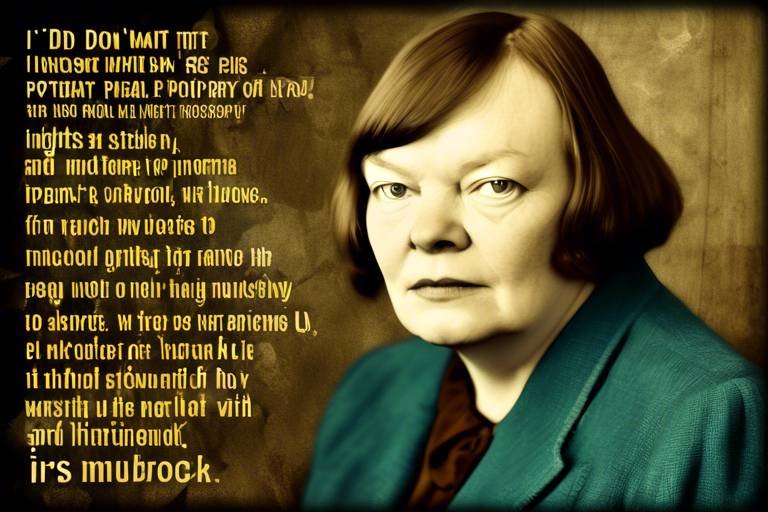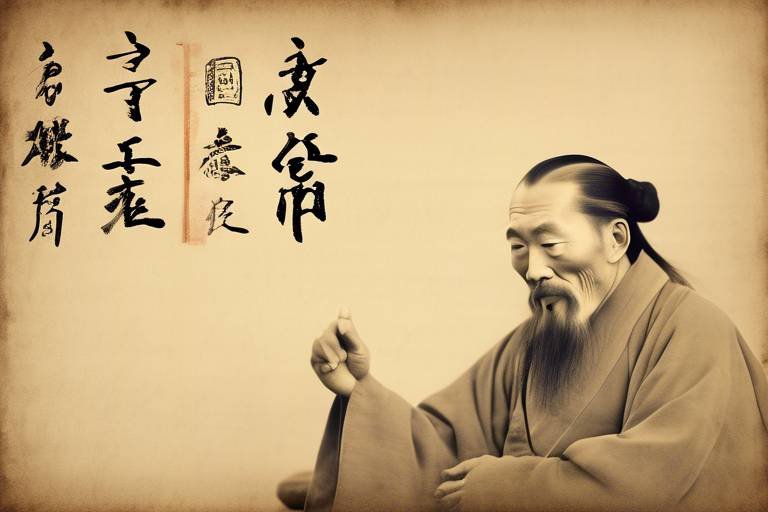Is Stoicism Still Relevant Today? Marcus Aurelius's View
In a world that often feels chaotic and overwhelming, the question arises: Is Stoicism still relevant today? The teachings of this ancient philosophy, particularly those of the Roman Emperor and philosopher Marcus Aurelius, offer profound insights that resonate even in our modern lives. Stoicism encourages us to cultivate a mindset centered on rationality, self-control, and virtue, which can be incredibly beneficial as we navigate the complexities of contemporary existence. By exploring the enduring principles of Stoicism, we can uncover tools to help us face challenges with grace and resilience.
Stoicism originated in ancient Greece and was later popularized in Rome, with Marcus Aurelius being one of its most notable proponents. His writings, especially the personal reflections found in his work Meditations, serve as a guide for anyone seeking to live a virtuous life amidst external turmoil. Aurelius's philosophical approach emphasizes the importance of understanding what is within our control and what is not, a lesson that is crucial for maintaining our mental well-being today.
As we delve deeper into the essence of Stoicism, we recognize that its core principles are remarkably applicable to the issues we face today. Whether it's dealing with stress at work, managing personal relationships, or coping with unexpected life changes, Stoicism offers a framework for approaching these situations with a calm and rational mindset. By embracing the teachings of Aurelius, we can learn to shift our focus from external circumstances to our internal responses, fostering a sense of peace and purpose.
Moreover, the relevance of Stoicism extends beyond personal development; it also intersects with modern psychological practices. For instance, cognitive-behavioral therapy (CBT) shares many principles with Stoic philosophy, particularly the idea that our thoughts shape our emotions and behaviors. By recognizing and challenging negative thought patterns, we can cultivate a more resilient and optimistic outlook on life. This synergy between ancient wisdom and contemporary psychology highlights the timeless nature of Stoic teachings and their ability to enhance our mental well-being.
In conclusion, the question of whether Stoicism is still relevant today is met with a resounding yes. Marcus Aurelius's insights not only provide a historical perspective but also offer practical guidance for navigating the trials of modern life. By embracing Stoic principles, we can cultivate a mindset that empowers us to respond to challenges with strength and clarity, ultimately leading to a more fulfilling and purposeful existence.
- What is Stoicism? Stoicism is an ancient philosophy that teaches the development of self-control and fortitude as a means to overcome destructive emotions.
- Who was Marcus Aurelius? Marcus Aurelius was a Roman Emperor and philosopher known for his writings on Stoicism, particularly in his work Meditations.
- How can I apply Stoicism in my daily life? You can apply Stoicism by focusing on what you can control, practicing mindfulness, and reflecting on your thoughts and actions regularly.
- Is Stoicism similar to modern psychology? Yes, many principles of Stoicism align with modern psychological practices, especially cognitive-behavioral therapy, which emphasizes changing negative thought patterns.

The Essence of Stoicism
Stoicism, a school of philosophy that emerged in ancient Greece, has stood the test of time, captivating minds for over two millennia. At its core, Stoicism teaches us the importance of rationality, self-control, and virtue, offering a powerful framework to navigate the complexities of life. Imagine life as a turbulent sea; Stoicism serves as our sturdy ship, helping us sail through storms with grace and composure. But what exactly makes Stoicism so relevant in today’s fast-paced world?
The origins of Stoicism can be traced back to the teachings of Zeno of Citium around 300 BCE. It flourished in the Hellenistic period and later gained prominence in Rome through philosophers like Seneca, Epictetus, and, most notably, Marcus Aurelius. One of the fundamental principles of Stoicism is the idea that while we cannot control external events, we can control our responses to them. This concept is particularly resonant today, as we often find ourselves overwhelmed by circumstances beyond our control, from global crises to personal challenges.
Central to Stoicism is the belief in virtue as the highest good. This virtue is defined by wisdom, courage, justice, and temperance. Stoics argue that living in accordance with these virtues leads to a fulfilling and meaningful life. It’s like planting a garden; if you nurture the right virtues, you’ll cultivate a life rich in purpose and satisfaction. Stoicism encourages us to focus on what we can change—our thoughts and actions—rather than what we cannot, fostering a sense of empowerment and inner peace.
Another essential tenet of Stoicism is the practice of mindfulness. This involves being present and fully engaged in the moment, a concept that has gained traction in modern psychology. By practicing mindfulness, we can better understand our emotions and reactions, allowing us to respond thoughtfully rather than react impulsively. For instance, when faced with criticism, instead of becoming defensive, a Stoic would reflect on the feedback and consider how it can help them grow. This reflective practice is what makes Stoicism a timeless tool for personal development.
To summarize, the essence of Stoicism lies in its emphasis on rational thinking, emotional resilience, and virtuous living. It teaches us to embrace life’s challenges with a calm and collected mindset, reminding us that true happiness comes from within. As we delve deeper into the teachings of Marcus Aurelius and other Stoic philosophers, we’ll uncover practical ways to apply these principles in our everyday lives, equipping ourselves to face whatever life throws our way.
| Core Principles of Stoicism | Description |
|---|---|
| Rationality | The ability to think clearly and logically, guiding our decisions and actions. |
| Self-Control | The practice of managing one’s emotions and impulses to maintain focus on what truly matters. |
| Virtue | Living a life aligned with wisdom, courage, justice, and temperance. |
| Mindfulness | Being present in the moment and aware of our thoughts and feelings. |

Marcus Aurelius: The Philosopher King
Marcus Aurelius, often celebrated as the "Philosopher King," embodies the very essence of Stoic philosophy. His reign as a Roman Emperor from 161 to 180 AD was not just marked by military conquests and political challenges, but also by a profound commitment to the principles of rationality, virtue, and self-discipline. Imagine a leader who, amidst the chaos of ruling an empire, took the time to reflect on his own thoughts and actions—this was Aurelius. His writings, particularly in his work Meditations, reveal a man deeply engaged in the practice of self-examination and philosophical inquiry.
Aurelius's life was a blend of duty and introspection. He faced numerous adversities, from wars on the frontiers of Rome to plagues that ravaged his people. Yet, rather than succumbing to despair, he turned to Stoicism as a guiding light. His approach to leadership was unique; he believed that a ruler's greatest strength lies not in power or control, but in wisdom and moral integrity. This belief is beautifully encapsulated in his writings, where he often muses about the importance of serving the common good and the value of humility.
His philosophical musings can be distilled into several key principles that resonate even today:
- Rationality: Aurelius emphasized the importance of reason in navigating life's challenges. He believed that by using rational thought, individuals could rise above their emotions and make better decisions.
- Self-Control: The ability to control one's impulses and desires was central to his teachings. Aurelius practiced this daily, reminding himself that true freedom comes from within.
- Virtue: Living a virtuous life was non-negotiable for Aurelius. He often reflected on what it meant to be a good person and how one's actions should align with ethical principles.
What sets Marcus Aurelius apart from other rulers is his genuine desire for personal growth and understanding. He didn't just preach Stoicism; he lived it. His Meditations serve as a personal diary, a record of his struggles and triumphs, and a guide for anyone seeking to navigate the complexities of life. Each entry is a testament to his commitment to self-improvement and philosophical inquiry, making it relatable even for modern readers.
In a world filled with distractions and superficial pursuits, Aurelius's teachings remind us of the importance of focusing on what truly matters. He believed that we should strive to be the best versions of ourselves, not for the sake of recognition, but for the sake of our own integrity and the well-being of others. His life and writings serve as a powerful reminder that, even in positions of authority, humility and wisdom should reign supreme.
Ultimately, Marcus Aurelius is not just a historical figure; he is a beacon of Stoic thought that continues to inspire countless individuals today. His ability to blend the responsibilities of leadership with the pursuit of personal virtue is a lesson that transcends time and remains profoundly relevant in our contemporary world.

The Meditations: A Stoic Manual
Marcus Aurelius's Meditations stands as a profound testament to the enduring power of Stoicism, offering a glimpse into the mind of a man who balanced the weight of an empire with the quest for personal virtue. Written as a series of personal reflections, this text is not just a philosophical treatise; it’s a manual for living that resonates with our contemporary struggles. Each passage serves as a reminder of the importance of rationality, self-control, and the pursuit of virtue amidst chaos.
In the Meditations, Aurelius emphasizes the significance of self-examination and the practice of daily reflections. He encourages readers to assess their thoughts and actions critically, asking themselves questions like, "What is in my control?" and "How should I respond to the challenges I face?" This practice of introspection is vital in today’s fast-paced world, where distractions abound and it’s easy to lose sight of what truly matters.
One of the key passages that encapsulates Stoic thought is Aurelius's reminder that “the impediment to action advances action. What stands in the way becomes the way.” This profound statement invites us to view obstacles not as hindrances but as opportunities for growth. It challenges us to shift our perspective and embrace the difficulties we encounter as essential components of our journey. In doing so, we cultivate a sense of resilience that empowers us to navigate life's unpredictability with grace.
Moreover, Aurelius’s reflections are steeped in the understanding that our thoughts shape our reality. He writes about the importance of maintaining a calm mind, stating that “you have power over your mind—not outside events. Realize this, and you will find strength.” This notion is incredibly relevant today, as we often find ourselves overwhelmed by external circumstances. By focusing on our internal responses rather than the chaos around us, we can reclaim our power and foster a sense of peace.
To illustrate the practical applications of Aurelius's teachings, let’s consider a few key themes from the Meditations:
- Acceptance: Embracing what we cannot change allows us to focus our energy on what we can control.
- Mindfulness: Being present in the moment helps us appreciate life and reduces anxiety about the future.
- Virtue: Striving for moral excellence guides our decisions and interactions with others.
Ultimately, the Meditations serve not only as a reflection of Marcus Aurelius's personal struggles but as a timeless guide for anyone seeking to cultivate a more meaningful existence. By integrating these Stoic principles into our daily lives, we can enhance our emotional resilience and find purpose even amid life’s challenges. The wisdom contained within these pages transcends time, proving that Stoicism is not merely an ancient philosophy but a relevant tool for modern living.
- What is Stoicism? Stoicism is an ancient Greek philosophy that teaches the development of self-control and fortitude as a means to overcome destructive emotions.
- How can I apply Stoicism to my life? You can apply Stoicism by practicing mindfulness, focusing on what you can control, and reflecting on your thoughts and actions regularly.
- What are the benefits of reading the Meditations? Reading the Meditations can provide insights into managing stress, improving emotional resilience, and fostering a sense of purpose.

Meditations,
This article explores the enduring relevance of Stoicism in modern life through the lens of Marcus Aurelius, examining its principles and how they can be applied to contemporary challenges.
Stoicism, a philosophy founded in ancient Greece, emphasizes the power of reason and the importance of virtue as a means to achieve a fulfilling life. Its core principles revolve around rationality, self-control, and the pursuit of moral integrity. By understanding these foundational concepts, we can appreciate why Stoicism remains a guiding force for many in today’s fast-paced world.
Marcus Aurelius, often referred to as the "Philosopher King," served as a Roman Emperor from 161 to 180 AD. His life was a fascinating blend of power, responsibility, and deep philosophical reflection. Through his writings, particularly in his renowned work, Meditations, he has left a legacy that continues to inspire countless individuals seeking wisdom and tranquility in their lives.
In Meditations, Marcus Aurelius shares his personal reflections and insights, providing a practical guide for applying Stoic philosophy in daily life. This collection of thoughts not only reveals his struggles and triumphs but also serves as a manual for anyone looking to cultivate inner peace amidst chaos. Key passages from the text highlight essential Stoic concepts, such as the importance of focusing on what we can control and accepting what we cannot. For instance, he famously wrote, "You have power over your mind—not outside events. Realize this, and you will find strength."
Aurelius practiced daily reflections, a technique that allowed him to center his thoughts and maintain perspective. These reflections often included reminders of the transient nature of life and the significance of living virtuously. By taking a few moments each day to contemplate our actions and thoughts, we can foster mindfulness and resilience, much like Aurelius did. This practice can be as simple as journaling or meditating, helping us to stay grounded in the present moment.
Adversity is an inevitable part of life, and Aurelius's teachings encourage us to embrace it with courage and acceptance. He believed that challenges are not just obstacles but opportunities for growth. By adopting a Stoic perspective, we can learn to view setbacks as valuable lessons rather than insurmountable problems. This shift in mindset empowers us to cultivate inner strength and maintain our composure, no matter the storm we face.
Interestingly, the principles of Stoicism have found a place in modern psychological practices, particularly in cognitive-behavioral therapy (CBT). Both Stoicism and CBT emphasize the importance of reframing negative thoughts and focusing on actionable solutions. By integrating Stoic techniques into therapeutic practices, individuals can enhance their mental well-being and develop healthier coping mechanisms.
Incorporating Stoic principles into our daily routines can significantly improve our emotional resilience and sense of purpose. Here are some practical strategies for doing so:
- Start each day with a moment of reflection, setting intentions for how you want to respond to challenges.
- Practice gratitude by acknowledging the positive aspects of your life, even during tough times.
- Focus on the present moment, letting go of regrets about the past and anxieties about the future.
Mindfulness plays a crucial role in Stoicism. By being present and aware, we can navigate life’s uncertainties with clarity and purpose. This practice encourages us to engage fully with our experiences, fostering a deeper understanding of ourselves and our reactions to the world around us. Just as Aurelius advised, we should strive to be mindful of our thoughts and actions, ensuring they align with our values and goals.
Stoic practices are powerful tools for building resilience. By learning to accept what we cannot control and focusing our energy on what we can influence, we create a balanced mindset that can weather life’s ups and downs. This resilience is akin to a tree that bends in the wind but does not break, allowing us to adapt and thrive even in challenging circumstances.
- What is Stoicism?
- Stoicism is an ancient philosophy that teaches the development of self-control and fortitude as a means of overcoming destructive emotions.
- How did Marcus Aurelius practice Stoicism?
- Marcus Aurelius practiced Stoicism through daily reflections, journaling his thoughts, and applying Stoic principles to his role as Emperor.
- Can Stoicism help with modern stress?
- Yes, Stoicism offers practical strategies for managing stress by focusing on what we can control and accepting what we cannot.

highlighting key passages that capture Stoic thought and its practical applications for everyday life.
Marcus Aurelius's Meditations is not just a collection of thoughts; it's a treasure trove of wisdom that resonates with anyone seeking to live a virtuous life. Written during his reign as Roman Emperor, these reflections serve as a personal diary where Aurelius grapples with the complexities of life, duty, and the human condition. Each passage is a reminder of the power of Stoic thought, urging us to cultivate inner peace amidst chaos. For instance, one of his most famous quotes, "You have power over your mind - not outside events. Realize this, and you will find strength," encapsulates the very essence of Stoicism. It emphasizes that our reactions to external circumstances define our experience, not the circumstances themselves.
Another poignant passage states, "The happiness of your life depends upon the quality of your thoughts." This highlights the importance of maintaining a positive mindset and suggests that our thoughts shape our reality. In practical terms, this means we can choose how we respond to challenges, which is a powerful tool in our modern lives. When faced with daily stresses, from work pressures to personal relationships, remembering that we can control our thoughts can be liberating. It allows us to approach these situations with a sense of calm and clarity.
Aurelius also writes, "The best revenge is to be unlike him who performed the injury." This passage encourages us to rise above negativity and not let the actions of others dictate our behavior. In a world where conflicts and misunderstandings are commonplace, this Stoic principle teaches us to maintain our integrity and not stoop to the level of those who wrong us. It serves as a reminder that we can choose our responses, fostering a sense of emotional resilience.
Moreover, Aurelius often reflects on the concept of impermanence. He states, "Everything is only for a day, both that which remembers and the remembered." This serves as a powerful reminder that life is fleeting, and we should cherish each moment. By understanding that everything is temporary, we can cultivate a greater appreciation for the present and let go of trivial grievances. This perspective can be incredibly grounding, especially during turbulent times.
Incorporating these teachings into our daily lives can seem daunting, but they are incredibly practical. Here are some ways to apply Aurelius's teachings:
- Daily Reflections: Set aside time each day to reflect on your thoughts and actions. Consider how they align with Stoic principles and where you can improve.
- Mindfulness Practices: Engage in mindfulness exercises that focus on being present. This can help you manage stress and maintain a balanced perspective.
- Journaling: Write down your thoughts and feelings, especially when faced with challenges. This can help clarify your mind and reinforce Stoic teachings.
By actively engaging with these principles, we can cultivate a more resilient mindset and navigate life’s ups and downs with grace. Marcus Aurelius’s Meditations serves not only as a historical document but as a practical guide for anyone looking to embrace Stoic philosophy in their everyday lives.
1. What is Stoicism?
Stoicism is an ancient Greek philosophy that teaches the development of self-control and fortitude as a means to overcome destructive emotions. It emphasizes rationality, virtue, and the importance of living in accordance with nature.
2. How can Stoicism help in modern life?
Stoicism provides practical tools for managing stress, building resilience, and maintaining a positive mindset. Its principles encourage individuals to focus on what they can control and accept what they cannot.
3. What are some key practices of Stoicism?
Key practices include daily reflections, mindfulness, and journaling. These practices help individuals align their thoughts and actions with Stoic ideals, fostering emotional strength and clarity.
4. Who was Marcus Aurelius?
Marcus Aurelius was a Roman Emperor and philosopher, known for his contributions to Stoic philosophy through his writings, particularly the Meditations, which reflect his thoughts on virtue, duty, and the human experience.
5. Can Stoicism be applied to mental health?
Yes, Stoicism has been integrated into modern psychological practices, such as cognitive-behavioral therapy (CBT), which focuses on changing negative thought patterns and behaviors to improve mental well-being.

Daily Reflections
Daily reflections are a cornerstone of Stoicism, acting as a powerful tool for self-examination and growth. Imagine starting each day with a moment of silence, a pause where you can sift through your thoughts, feelings, and intentions. This practice, championed by Marcus Aurelius, encourages individuals to confront their inner selves, fostering a deeper understanding of their emotions and reactions to the world around them. By dedicating time each day to reflect, you can cultivate a sense of mindfulness that permeates every aspect of your life.
In his Meditations, Aurelius often emphasized the importance of self-reflection. He believed that by evaluating our actions and thoughts regularly, we can align ourselves more closely with our values and principles. This isn’t just about identifying what went wrong or right; it’s about understanding the 'why' behind our actions. For instance, if you find yourself feeling frustrated during a challenging meeting, a moment of reflection can help you identify the triggers of that frustration. Was it the behavior of a colleague? Or maybe it was your own expectations? This kind of introspection allows for growth and adjustment, transforming negative experiences into valuable lessons.
To incorporate daily reflections into your routine, consider setting aside a few minutes each morning or evening. Here’s a simple structure you can follow:
- Identify Your Feelings: Start by acknowledging how you feel. Are you anxious, excited, or perhaps overwhelmed?
- Evaluate Your Actions: Reflect on your actions from the previous day. Did you act in accordance with your values? Were there moments where you could have responded differently?
- Set Intentions: Conclude with a clear intention for the day ahead. What do you want to focus on? How will you navigate challenges?
This structured approach not only enhances self-awareness but also instills a sense of purpose and direction. Remember, the goal isn’t to judge yourself harshly but to understand and learn. As Aurelius wisely stated, “The happiness of your life depends upon the quality of your thoughts.” By engaging in daily reflections, you can elevate the quality of your thoughts, leading to a more fulfilling and resilient life.
Moreover, keeping a journal can significantly enhance this practice. Writing down your reflections allows you to track your growth over time, providing tangible evidence of your journey. You might be surprised at how much you evolve when you take the time to document your thoughts and feelings. It’s like creating a roadmap of your inner world. Just like a traveler needs a map to navigate unfamiliar terrain, you need your reflections to guide you through life’s complexities.
In conclusion, daily reflections are not merely an exercise in introspection; they are a vital practice for anyone looking to embrace the Stoic philosophy. By regularly pausing to reflect, you cultivate a mindset of resilience and mindfulness, preparing yourself to face whatever challenges life throws your way. So, why not start today? Grab a journal, find a quiet space, and begin your journey of self-discovery through daily reflections.
- What is the purpose of daily reflections in Stoicism? Daily reflections help individuals gain self-awareness, align actions with values, and foster personal growth.
- How can I start practicing daily reflections? Set aside a few minutes each day to acknowledge your feelings, evaluate your actions, and set intentions.
- Can journaling enhance the practice of daily reflections? Yes! Journaling allows you to document your thoughts and track your growth over time.
- Is it necessary to reflect daily? While daily reflections are beneficial, the frequency can be adjusted based on personal preference and lifestyle.

Facing Adversity
Adversity is an inevitable part of life, like a storm that rolls in unexpectedly, disrupting our plans and challenging our resolve. Marcus Aurelius, the Stoic philosopher and Roman Emperor, offers timeless wisdom on how to navigate these turbulent waters. His teachings remind us that while we cannot control external events, we can control our reactions to them. This fundamental principle is at the heart of Stoicism and serves as a powerful tool for anyone facing difficulties.
Imagine standing at the edge of a cliff, staring down at the tumultuous sea below. The waves crash violently against the rocks, and the wind howls in your ears. In that moment, you have a choice: succumb to fear and despair or harness your inner strength and face the challenge head-on. Aurelius teaches us that embracing adversity is not just about enduring hardship; it's about recognizing that every challenge presents an opportunity for growth. He famously stated, "The impediment to action advances action. What stands in the way becomes the way." This profound insight encourages us to view obstacles not as barriers, but as stepping stones towards personal development.
In practical terms, facing adversity through a Stoic lens involves several key strategies:
- Acceptance: Acknowledge the situation for what it is. Acceptance doesn't mean resignation; it means recognizing reality without distortion.
- Perspective: Shift your viewpoint. Instead of seeing adversity as a misfortune, consider it a chance to build resilience and character.
- Focus on What You Can Control: Concentrate your efforts on your responses and actions. This empowers you to take charge of your life amidst chaos.
By implementing these strategies, individuals can cultivate a mindset that not only withstands adversity but thrives in its presence. Aurelius's reflections serve as a guide, encouraging us to maintain our composure and integrity even when faced with life's greatest challenges. He understood that the true test of character is not how we act in times of ease, but how we respond when the going gets tough.
Moreover, Aurelius's teachings remind us that we are not alone in our struggles. Throughout history, countless individuals have faced adversity, and each story of resilience adds to the rich tapestry of human experience. By connecting with others and sharing our challenges, we can foster a sense of community and support that makes facing adversity a little less daunting. Stoicism teaches us to find strength in solidarity, reminding us that while we may be solitary in our thoughts, we are never truly alone in our experiences.
In conclusion, facing adversity is a fundamental aspect of the human experience, and Stoicism provides a robust framework for navigating these challenges. By embracing the teachings of Marcus Aurelius, we can transform our approach to difficulties, viewing them not merely as obstacles but as vital opportunities for growth and self-discovery. In doing so, we cultivate a resilient spirit that can weather any storm life throws our way.
Q: How can Stoicism help me in my daily life?
A: Stoicism teaches you to focus on what you can control, helping you maintain a balanced perspective in challenging situations.
Q: What are some practical Stoic exercises?
A: Daily reflections, journaling, and practicing mindfulness are effective ways to incorporate Stoicism into your routine.
Q: Is Stoicism relevant for everyone?
A: Yes! Stoicism offers universal principles that can benefit anyone, regardless of their background or circumstances.

Stoicism in Modern Psychology
Stoicism, an ancient philosophy that emphasizes rational thinking and emotional resilience, has found a surprising ally in modern psychology. This connection is not merely a coincidence; rather, it speaks volumes about the timeless nature of Stoic principles. In a world that often feels chaotic and overwhelming, the teachings of Stoicism offer a beacon of hope and clarity. Imagine navigating through a stormy sea with a sturdy ship; Stoicism provides the tools to build that ship.
One of the most fascinating intersections between Stoicism and psychology lies in the realm of cognitive-behavioral therapy (CBT). CBT is a widely practiced therapeutic approach that helps individuals identify and challenge negative thought patterns. Sound familiar? Stoics like Marcus Aurelius and Seneca advocated for a similar process of self-examination and rational thinking. They believed that our thoughts shape our emotions and actions, a concept that is echoed in modern psychological practices. By recognizing and reframing irrational beliefs, individuals can cultivate a healthier mindset, much like a gardener pruning a tree to allow for new growth.
Furthermore, Stoicism encourages individuals to focus on what they can control and to accept what they cannot. This principle aligns perfectly with the psychological concept of locus of control, which refers to how much control individuals believe they have over their lives. A strong internal locus of control is linked to better mental health and resilience. By embracing Stoic teachings, individuals can shift their perspectives, learning to let go of the need to control external circumstances and instead focus on their responses. This shift can be liberating, akin to shedding a heavy backpack filled with unnecessary burdens.
In addition to CBT, the practice of mindfulness has gained traction in both Stoicism and modern psychology. Stoics emphasized the importance of being present and fully engaging with the moment, a concept that is mirrored in mindfulness practices today. Mindfulness encourages awareness of one’s thoughts and feelings without judgment, allowing individuals to observe their emotional states rather than being overwhelmed by them. This practice not only enhances emotional regulation but also fosters a sense of peace and acceptance, much like a calm lake reflecting the sky above.
To illustrate the practical applications of Stoicism in modern psychology, consider the following table that summarizes key Stoic principles alongside their psychological counterparts:
| Stoic Principle | Psychological Concept | Application |
|---|---|---|
| Focus on what you can control | Locus of Control | Encourages personal responsibility and reduces anxiety. |
| Emotional resilience | Emotional Regulation | Helps individuals manage stress and adversity. |
| Mindfulness and presence | Mindfulness | Enhances awareness and acceptance of current experiences. |
| Self-reflection | Cognitive Restructuring | Facilitates the identification of negative thought patterns. |
As we delve deeper into the connection between Stoicism and psychology, it becomes clear that these ancient teachings are not just relics of the past. They are powerful tools that can help us navigate the complexities of modern life. By integrating Stoic principles into our daily routines, we can cultivate greater emotional resilience and a more profound sense of purpose. So, the next time you find yourself overwhelmed by life's challenges, remember the wisdom of the Stoics and the insights of modern psychology. They might just be the guiding stars you need to find your way.
- What is Stoicism? Stoicism is an ancient Greek philosophy that teaches the development of self-control and fortitude to overcome destructive emotions.
- How does Stoicism relate to modern psychology? Stoicism shares principles with modern psychological practices such as cognitive-behavioral therapy and mindfulness, focusing on emotional resilience and rational thinking.
- Can Stoicism improve mental health? Yes, by promoting emotional regulation and a focus on what can be controlled, Stoicism can enhance overall mental well-being.
- Who was Marcus Aurelius? Marcus Aurelius was a Roman Emperor and Stoic philosopher known for his writings on Stoicism, particularly his work "Meditations."

Application of Stoicism in Daily Life
Stoicism isn't just a dusty philosophy from ancient Rome; it's a powerful tool for navigating the complexities of modern life. Imagine waking up each day armed with a mindset that allows you to tackle challenges head-on, without getting swept away by emotional turmoil. That's the essence of applying Stoic principles in your daily routine. So, how can you incorporate this ancient wisdom into your modern life? Let's dive into some practical strategies that can help you cultivate emotional resilience and foster a sense of purpose, even when the going gets tough.
One of the fundamental practices of Stoicism is the concept of mindfulness. This isn't just about sitting cross-legged and meditating; it's about being fully present in each moment. When you embrace mindfulness, you're not just going through the motions of life; you're actively engaging with it. This means taking a moment to pause before reacting to a stressful situation. Instead of letting your emotions dictate your responses, you can reflect on the situation, assess it rationally, and choose a response that aligns with your values. This practice can transform how you handle daily stressors, whether they come from work, relationships, or unexpected events.
Another critical aspect of Stoicism is the development of resilience. Life is full of ups and downs, and the ability to bounce back from setbacks is essential. Stoicism teaches us that while we cannot control external events, we can control our reactions to them. For instance, when faced with adversity, instead of wallowing in despair, you can view challenges as opportunities for growth. This shift in perspective can be incredibly empowering. You might even consider keeping a Stoic journal, where you reflect on your daily experiences, challenges, and your responses to them. This practice not only enhances self-awareness but also helps you track your progress in developing a Stoic mindset.
To further illustrate how Stoicism can be applied, consider the following table that outlines practical Stoic exercises you can incorporate into your daily life:
| Stoic Practice | Description | Benefits |
|---|---|---|
| Morning Reflection | Spend a few minutes each morning contemplating your day ahead and potential challenges. | Increases preparedness and reduces anxiety. |
| Evening Review | Reflect on your day, assessing your reactions and decisions. | Enhances self-awareness and promotes personal growth. |
| Negative Visualization | Imagine losing something or someone important to cultivate gratitude. | Increases appreciation for what you have and reduces fear of loss. |
In addition to these practices, it's essential to remember that Stoicism encourages community and connection. While Stoicism may seem like a solitary pursuit, it actually emphasizes the importance of relationships and the shared human experience. Engaging with others, sharing your thoughts, and practicing empathy can enhance your understanding of Stoic principles. After all, the Stoics believed that we are all part of a larger whole, and supporting one another is crucial for our collective well-being.
In conclusion, the application of Stoicism in daily life is about embracing a mindset that promotes resilience, mindfulness, and community. By integrating these principles into your routine, you can navigate life's challenges with grace and purpose. So, the next time you face a difficult situation, remember the Stoic teachings and ask yourself: How can I respond in a way that reflects my values and strengthens my character?
- What is Stoicism? Stoicism is an ancient Greek philosophy that teaches the development of self-control and fortitude as a means of overcoming destructive emotions.
- How can I practice Stoicism daily? You can practice Stoicism by incorporating daily reflections, mindfulness, and resilience-building exercises into your routine.
- Is Stoicism relevant today? Yes, Stoicism is highly relevant today as it offers practical strategies for managing stress, improving mental well-being, and fostering emotional resilience.

Mindfulness and Presence
In our fast-paced world, where distractions are just a click away, the idea of mindfulness and presence can feel like a distant memory. However, the teachings of Stoicism, particularly those of Marcus Aurelius, remind us that being present is not just a luxury but a necessity for a fulfilling life. Aurelius, in his Meditations, emphasizes the importance of focusing on the moment at hand, urging us to engage fully with our experiences rather than getting lost in regrets about the past or anxieties about the future.
Mindfulness, at its core, is about cultivating an awareness of our thoughts, feelings, and surroundings. It’s like tuning into a radio station; if the dial is off, all you hear is static. But when you adjust it just right, the music comes through clearly. Similarly, when we practice mindfulness, we fine-tune our attention, allowing us to experience life more vividly. Aurelius reminds us that “You have power over your mind—not outside events. Realize this, and you will find strength.” This quote encapsulates the essence of Stoic mindfulness: understanding that our perception shapes our reality.
Moreover, being present allows us to respond to life’s challenges with clarity and composure. When we’re caught up in a whirlwind of thoughts, it’s easy to react impulsively. However, Stoicism teaches us to pause, reflect, and choose our responses wisely. Imagine facing a stressful situation at work. Instead of reacting out of frustration, a mindful approach encourages you to take a deep breath, assess the situation, and respond with a level head. This practice not only enhances our emotional resilience but also fosters healthier relationships with those around us.
To cultivate mindfulness in our daily lives, we can incorporate simple practices that resonate with Stoic principles. Here are a few strategies:
- Daily Reflection: Take a few minutes each day to reflect on your thoughts and actions. What went well? What could you improve?
- Mindful Breathing: Engage in deep breathing exercises to ground yourself in the present moment. Just a few minutes can make a significant difference.
- Nature Walks: Spend time in nature, observing the sights and sounds around you. This helps to cultivate a sense of presence and connection to the world.
Incorporating these practices into our routines can transform the way we experience life. We become more attuned to our emotions, allowing us to navigate the complexities of existence with grace and poise. As Aurelius wisely noted, “The happiness of your life depends upon the quality of your thoughts.” By embracing mindfulness and presence, we can elevate our thoughts and, in turn, our lives.
In conclusion, the Stoic approach to mindfulness is not just about quieting the mind; it’s about engaging with the world around us, fostering a deeper understanding of ourselves, and responding thoughtfully to life’s myriad challenges. By embracing the lessons of Marcus Aurelius, we can cultivate a profound sense of presence that enriches our daily experiences and strengthens our emotional resilience.
- What is Stoicism? Stoicism is an ancient Greek philosophy that teaches the development of self-control and fortitude as a means to overcome destructive emotions.
- How can I practice mindfulness? You can practice mindfulness through meditation, deep breathing exercises, and by being fully present in your daily activities.
- What are some benefits of mindfulness? Benefits include reduced stress, improved focus, and a greater sense of emotional well-being.
- How does Stoicism relate to modern psychology? Stoicism shares similarities with cognitive-behavioral therapy, both emphasizing the importance of thought patterns in emotional regulation.

Building Resilience
In a world that often feels like a rollercoaster ride, filled with unexpected twists and turns, is not just an option; it's a necessity. Stoicism, with its rich philosophical heritage, offers profound insights into how we can cultivate this essential quality. At its core, resilience is about the ability to bounce back from challenges, adapt to change, and keep moving forward despite setbacks. But how do we develop this resilience? Well, let’s dive into some Stoic principles that can guide us.
First and foremost, one of the key tenets of Stoicism is the idea of distinguishing between what we can control and what we cannot. This simple yet powerful concept can significantly alter our approach to life's difficulties. For instance, when faced with a challenging situation, ask yourself: “What is within my control?” Focus your energy on those aspects while accepting that external circumstances may be beyond your reach. This shift in perspective not only alleviates stress but also empowers you to take actionable steps toward improvement.
Another vital aspect of resilience is the practice of self-reflection. Marcus Aurelius emphasized the importance of examining our thoughts and actions regularly. By engaging in daily reflections, we can identify patterns in our behavior and thought processes that might hinder our resilience. This practice encourages mindfulness, allowing us to recognize negative thought cycles and replace them with more constructive ones. Imagine it like cleaning out a cluttered garage; once you clear out the unnecessary junk, you create space for new possibilities.
Moreover, embracing challenges as opportunities for growth is a hallmark of Stoic thought. Instead of viewing obstacles as roadblocks, try to see them as stepping stones. This shift in mindset can transform how we approach difficulties. For example, when you encounter a setback at work, rather than feeling defeated, consider what lessons you can learn from the experience. This proactive approach not only fosters resilience but also builds confidence in your ability to handle whatever life throws your way.
Additionally, surrounding yourself with a supportive community can greatly enhance your resilience. Stoicism teaches us the value of friendship and camaraderie. Share your struggles with trusted friends or family members who can offer perspective and encouragement. Just as a tree stands stronger when its roots intertwine with others, so too do we become more resilient when we lean on our support networks.
Lastly, let’s not forget the power of gratitude. Acknowledging the positives in our lives, even amidst chaos, can create a buffer against stress and negativity. Consider keeping a gratitude journal where you jot down three things you’re thankful for each day. This simple practice can shift your focus from what's going wrong to what's going right, reinforcing a resilient mindset.
In summary, building resilience through Stoicism involves a blend of self-awareness, community support, and a positive outlook on challenges. By embracing these principles, you can navigate life's uncertainties with a sense of purpose and strength. Remember, resilience is not about avoiding pain; it’s about learning to dance in the rain.
- What is resilience in the context of Stoicism?
Resilience in Stoicism refers to the ability to withstand and recover from life's challenges by focusing on what we can control and accepting what we cannot. - How can I practice self-reflection?
Self-reflection can be practiced through journaling, meditation, or simply taking time each day to think about your thoughts and actions critically. - What role does community play in building resilience?
A supportive community provides encouragement and perspective, helping individuals navigate difficulties more effectively. - How can gratitude enhance resilience?
Practicing gratitude shifts focus from negative experiences to positive aspects of life, fostering a more resilient mindset.
Frequently Asked Questions
- What is Stoicism?
Stoicism is an ancient Greek philosophy that emphasizes rationality, self-control, and virtue. It teaches individuals to focus on what they can control and accept what they cannot, leading to a more balanced and fulfilling life.
- How can Stoicism be applied in modern life?
Stoicism can be applied in various ways today, such as practicing mindfulness, embracing daily reflections, and developing resilience in the face of challenges. By integrating Stoic principles into daily routines, individuals can cultivate emotional strength and clarity.
- Who was Marcus Aurelius?
Marcus Aurelius was a Roman Emperor and a prominent Stoic philosopher. His writings, particularly in his work Meditations, reflect his thoughts on Stoicism and provide practical wisdom for navigating life's difficulties.
- What are the key teachings of Marcus Aurelius?
Key teachings of Marcus Aurelius include the importance of self-discipline, the practice of daily reflection, and the acceptance of adversity. He believed that maintaining a rational mindset could help individuals overcome challenges and lead a virtuous life.
- How does Stoicism relate to modern psychology?
Stoicism has influenced modern psychological practices, particularly cognitive-behavioral therapy (CBT). Both emphasize the power of thoughts in shaping emotions and behaviors, promoting mental well-being through rational thinking and resilience.
- Can Stoicism help with mental health issues?
Yes, Stoicism can be beneficial for mental health by providing tools for managing stress, anxiety, and negative emotions. Its focus on acceptance and rational thinking encourages a healthier perspective on challenges and promotes emotional resilience.
- What is the importance of daily reflections in Stoicism?
Daily reflections are crucial in Stoicism as they encourage mindfulness and self-awareness. By taking time to reflect on thoughts and actions, individuals can better understand themselves and align their behaviors with their values.
- How can I start practicing Stoicism?
You can start practicing Stoicism by incorporating daily reflections, reading Stoic texts like Meditations, and focusing on what you can control. Begin with small changes, such as maintaining a gratitude journal or practicing mindfulness exercises.



















